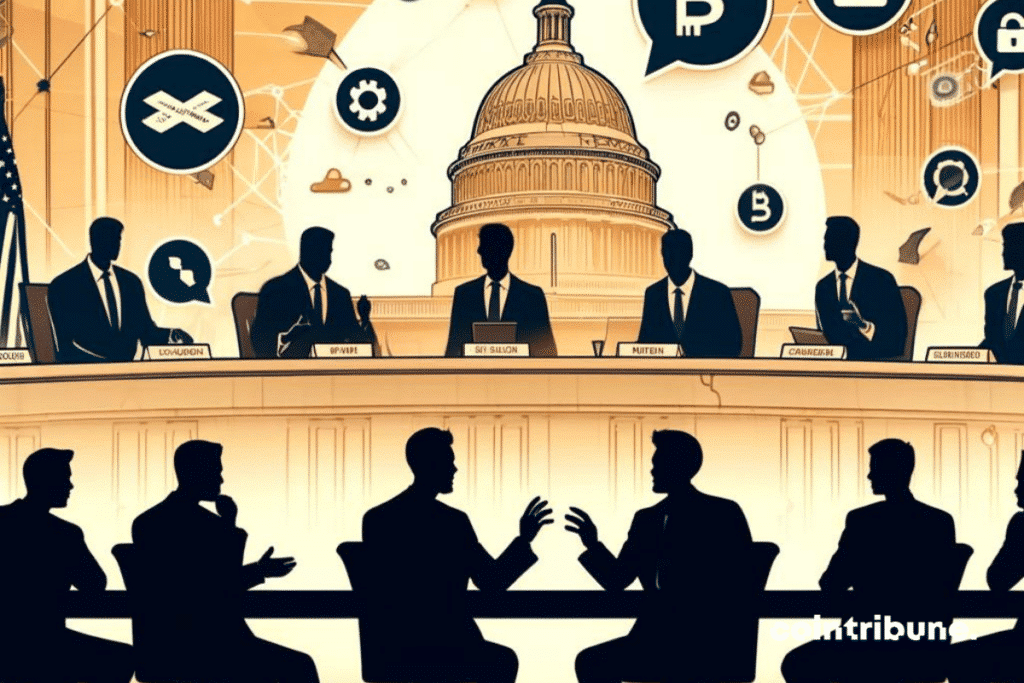Wednesday September 11, 2024 ▪
4
min read ▪ by
Decentralized finance (DeFi) is increasingly becoming a must-have revolution. This week, the US Congress held its first-ever hearing on DeFi, a historic milestone for a sector that is already worth $67 billion. The debate reflects the deep divisions within the US legislature, with Republicans praising the innovation and economic freedoms offered by DeFi, while Democrats warn of the increased risks of fraud and lack of regulation.

The legislative framework under tension
In this first hearing, members of Congress debated how to handle the rapid growth of DeFi. Many voices were heard. On one side, Republican Warren DAVIDSON of Ohio argued that “DeFi is essential to a vibrant financial sector in the United States.” He emphasized that the technology could bring multiple efficiencies by eliminating traditional intermediaries. “Decentralized finance represents an opportunity to modernize the American financial system and preserve economic freedom,” he said.
On the other hand, Democrats like Brad Sherman of California are much more skeptical. They point to the risks of an unregulated financial sector. For Sherman, “the complexity of DeFi exceeds that of traditional financial markets, making it a breeding ground for fraud.”
What choice to make between innovation or strict regulation?
Beyond these partisan positions, several witnesses offered nuanced views on DeFi regulation. Republican witness Brian AVELLO, general counsel at Universal DeFi Holding Company, said DeFi should not be subject to the same regulations as traditional finance. Democratic witness Mark ALLEN HAYS, a senior analyst at Americans for Financial Reform, stressed the need to apply existing regulations to DeFi to protect investors from abuse. Rebecca RETTIG, a representative of Polygon Labs, proposed that DeFi be recognized as “critical infrastructure.” “Agencies like the Cybersecurity and Infrastructure Security Agency (CISA) could play a role in overseeing the sector,” she suggested. Another expert, Amanda TUMINELLI of the DeFi Education Fund, argued against strictly applying traditional financial regulations to DeFi, saying it would stifle innovation.
The future of DeFi in the United States, however, still seems uncertain. While the Republican position advocates a minimalist regulatory approach, Democrats’ concerns about consumer protection remain legitimate. The debate could evolve towards a hybrid framework where DeFi would benefit from adapted regulation without hindering its innovation potential. This would require a constructive dialogue between the two parties and a better understanding of the technological and financial issues. In the short term, new hearings will likely be necessary to determine which legal framework will maximize the benefits of DeFi and minimize the risks for users.
The US Congressional hearing on DeFi marks a decisive step in the regulation of the financial sector. It must be said that the stakes are enormous. On the one hand, the promise of freer and more accessible finance, on the other, the very real risks of an unregulated market. As new regulations loom, the future of DeFi seems to depend on a delicate balance between economic freedom and investor protection.
Maximize your Cointribune experience with our “Read to Earn” program! For each article read, earn points and access exclusive rewards. Sign up now and start enjoying benefits.
A graduate of Sciences Po Toulouse and holder of a blockchain consultant certification issued by Alyra, I joined the Cointribune adventure in 2019. Convinced of the potential of blockchain to transform many sectors of the economy, I made a commitment to raise awareness and inform the general public about this constantly evolving ecosystem. My goal is to enable everyone to better understand blockchain and seize the opportunities it offers. I strive every day to provide an objective analysis of current events, decipher market trends, relay the latest technological innovations and put into perspective the economic and societal challenges of this ongoing revolution.
DISCLAIMER
The views, thoughts and opinions expressed in this article are solely those of the author and should not be considered investment advice. Do your own research before making any investment decision.

